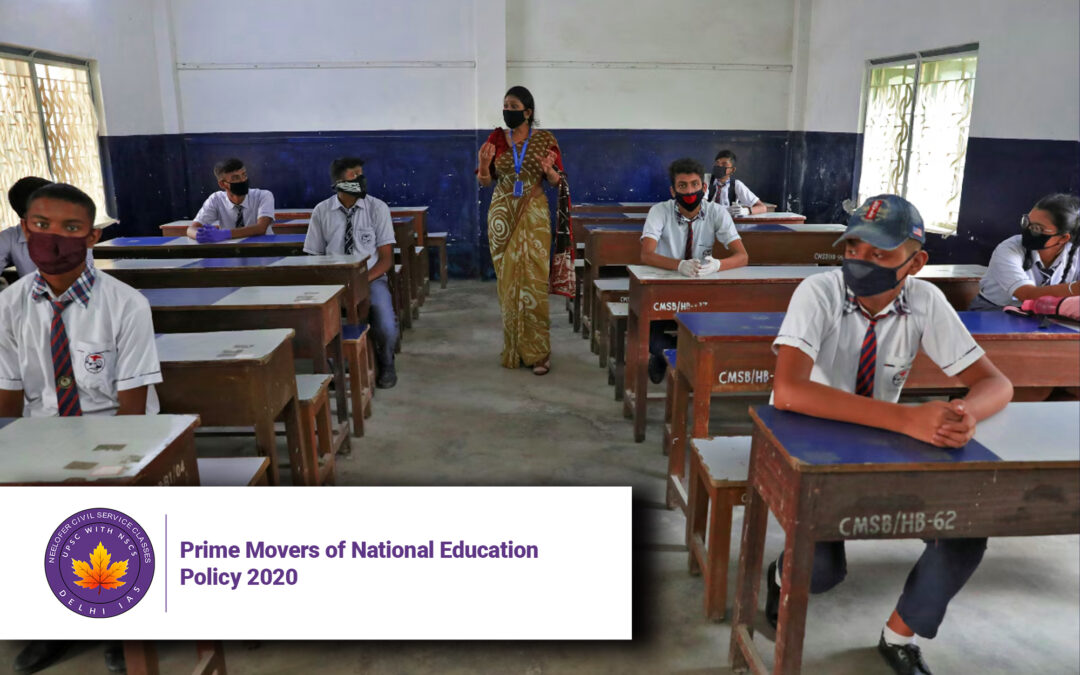Prime Movers of National Education Policy 2020
Why in News
The National Education Policy (NEP) 2020 has emerged as one of the most transformative policy frameworks in the Indian education system since independence. It has introduced sweeping reforms with a focus on holistic learning, vocational training, digital transformation, and inclusivity. With its vision aligning with Atmanirbhar Bharat and Viksit Bharat@2047, NEP 2020 continues to be in discussion due to its role in reshaping India’s youth power (Yuva Shakti) and connecting education with employment, innovation, and nation-building.
Introduction
The National Education Policy 2020, announced after a gap of 34 years since the previous policy of 1986, represents a paradigm shift in India’s educational landscape. It is not just an education reform, but a national movement towards empowering the youth through experiential learning (Karke Seekho), community-based approaches, and technology-driven systems.
NEP 2020 acts as a learning tool for creating a generation of thinkers, innovators, and skilled professionals. Its design embodies the vision of Hon’ble Prime Minister Narendra Modi, who emphasized the triad of Intelligence, Idea, and Innovation during his Mann Ki Baat address.
The policy integrates India’s diverse needs: from strengthening research and innovation to promoting vocational education, empowering women, and making students future-ready. Importantly, NEP 2020 aligns education with India’s journey of becoming a knowledge-driven, digitally advanced, and self-reliant economy.
Key Issues and Background
1. Reinventing the Educational Ecosystem
The Indian education system had long been criticized for rote learning, lack of vocational focus, and disconnect from employability skills. NEP 2020 addresses these concerns by emphasizing holistic development, practical learning, and critical thinking.
It introduces flexible curricula, multiple entry and exit options, and integration of vocational training from school levels to higher education. This reform is a direct response to India’s demographic dividend, where more than 60% of the population is under 35 years of age.
2. Science and Innovation Linkages
The “Lab to Market” initiative under the Office of the Principal Scientific Advisor and Science and Technology clusters reflects the growing need to bridge academia, industry, and research. This strengthens the “Vocal for Local” movement, transforming India from a service-based to a production-oriented economy.
Similarly, CSIR’s Jigyasa Virtual Labs and the One Day as a Scientist program offer experiential learning for students, making them explore scientific temper not just through textbooks but through hands-on experiments and lab exposure.
3. Digital India Integration
Digital learning is a cornerstone of NEP 2020. Initiatives such as SWAYAM (NPTEL), DIKSHA, Swayam Prabha, and e-Pathshala allow access to quality education across socio-economic and geographical barriers. These platforms help develop competence in knowledge, future-ready skills, and employability.
Moreover, the policy promotes Online and Distance Learning (ODL) and short-term certification courses such as Lok Vidya, ensuring that students not only graduate with degrees but also with industry-relevant skills.
Specific Impacts and Achievements
1. Driving Community-Based Learning
Through initiatives like Unnat Bharat Abhiyan and RuTAG (Rural Technology Action Group), NEP 2020 promotes community-based learning where higher education institutions collaborate with rural communities to address local problems using technology and innovation.
This helps in rural development, sustainable growth, and empowers students to engage with real-world issues.
2. Empowering Vocational Education
The Recognition of Prior Learning (RPL) is a major milestone under NEP 2020. It acknowledges skills and knowledge acquired outside formal education and integrates them into the academic system. This makes vocational education a mainstream and respectable pathway.
3. Women Empowerment and Inclusivity
NEP 2020 plays a pivotal role in women’s empowerment through initiatives like Beti Bachao, Beti Padhao, by promoting gender equality and access to education. The policy envisions creating a more inclusive and equitable system that leaves no student behind.
4. Research and Higher Education
The establishment of the National Research Foundation (NRF), also called the Anusandhan National Research Foundation (ANRF), is a landmark achievement. With objectives to foster core scientific research, innovation, and entrepreneurship, NRF encourages students and faculty to pursue high-quality research and contribute to India’s knowledge economy.
5. Digital and Smart India Mission
NEP 2020 is closely aligned with the Swachh Bharat Mission (SBM) and the broader Digital India programme, which have collectively transformed India into a Smart India. Integration of digital health, SCADA systems, data centers, intelligent transport, and AI-driven waste management demonstrates how technology and education can together create sustainable ecosystems.
Challenges and the Way Forward
While NEP 2020 is visionary, its implementation faces several challenges:
-
Infrastructure Gaps – Many rural and semi-urban areas still lack access to internet connectivity, smart classrooms, and digital devices.
-
Teacher Training – Teachers need to be continuously trained in experiential and digital pedagogies.
-
Funding – Sustaining large-scale initiatives like NRF, RuTAG, and national digital platforms requires significant financial commitment.
-
Balancing Tradition and Modernity – While promoting technology, the policy must also preserve India’s cultural heritage, languages, and traditional knowledge systems.
-
Monitoring and Accountability – Regular evaluation mechanisms are essential to ensure that reforms translate into measurable outcomes.
The way forward lies in collaborative governance involving the government, private sector, academia, and civil society. By 2047, NEP 2020 envisions an education system that is globally competitive, locally relevant, and socially inclusive.
Conclusion
The National Education Policy 2020 stands as a beacon of transformation for India’s education sector. By reinforcing learning through experience, integrating digital tools, and promoting inclusivity, NEP 2020 empowers Yuva Shakti to become leaders of tomorrow.
From “Lab to Market” innovations to gender empowerment, from vocational recognition to research foundations, the policy covers every spectrum of learning. Its success stories—such as Prime Minister Internship, National Apprenticeship 2.0, and Apprenticeship Enabled Degree Programme—highlight its real-world impact.
Ultimately, NEP 2020 is not merely about academic reforms but about nation-building through education. It is a roadmap to achieving Sustainable Development Goals (SDGs 4, 5, 9, and 10) and marching towards the vision of a Viksit Bharat by 2047.
5 Questions and Answers
Q1. What is the primary focus of the National Education Policy 2020?
Answer: NEP 2020 focuses on holistic development, experiential learning, vocational education, inclusivity, and aligning education with employability, innovation, and nation-building.
Q2. How does NEP 2020 promote vocational education?
Answer: Through initiatives like Recognition of Prior Learning (RPL), short-term certifications (Lok Vidya), and integration of vocational training in schools and colleges, NEP 2020 mainstreams skill-based education.
Q3. What role does the National Research Foundation (NRF) play under NEP 2020?
Answer: NRF fosters scientific and technological research, innovation, and entrepreneurship by providing funding, mentorship, and collaboration opportunities in higher education institutions.
Q4. Which digital platforms have been developed under NEP 2020 to promote online learning?
Answer: Platforms such as SWAYAM (NPTEL), DIKSHA, Swayam Prabha, and e-Pathshala enable students to access quality education, enhance skills, and become industry-ready.
Q5. How does NEP 2020 contribute to women empowerment?
Answer: By implementing the Beti Bachao, Beti Padhao policy, promoting gender equality in education, and creating inclusive opportunities, NEP 2020 empowers women and supports their active participation in nation-building.



